AI Agents vs. AI Operators: What They Are and How They Differ
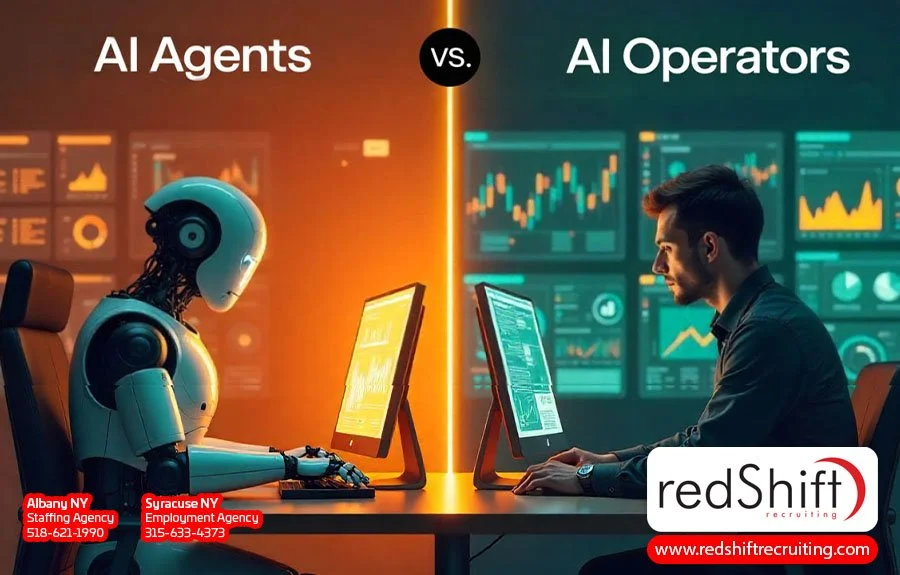
From chatbots to copilots to orchestration platforms, the language of AI can get overwhelming fast. Two terms that often sound deceptively similar are “AI agents” and “AI operators.” While they work closely together, they serve very different purposes: one is built to perform tasks, the other to guide and oversee AI systems. In AI agents vs. AI operators, we’ll break down what each term means, show how they differ, and explore real-world examples of where they’re already making an impact.
What Is an AI Agent?
An AI agent is an autonomous AI system that can perceive its environment, make decisions, and operate independently toward a defined goal. These systems can perform tasks and adapt their behavior without human intervention, often using tools and resources such as APIs or databases to carry out work. They typically run in a continuous loop of observing, planning, acting, and reflecting, a process through which AI agents learn and refine their performance over time.
In practice, some take the form of AI assistants that can schedule meetings, manage data, automate workflows, or conduct research. Advances in machine learning and artificial intelligence technologies have further paved the way for fully autonomous agents, capable of executing actions that go beyond simple predefined tasks.
Interested in taking a deeper dive into how agentic AI works? 👉 Read our full article on AI Agents:
What Are AI Agents?What Is an AI Operator?
The term AI operator doesn’t have a single fixed definition, but in many cases, it refers to a person who manages and guides AI systems, providing human oversight while ensuring alignment with ethics, compliance, and organizational strategy. Whereas agents accomplish tasks directly, operators focus on setting direction and managing outcomes, often coordinating multiple AI agents to maintain quality control, safeguard sensitive data, and keep results aligned with business goals. When direct human intervention is required, operators step in to correct errors or make judgment calls if agents act independently in ways that could introduce risk.
In other contexts, the term describes orchestration tools designed to manage several AI agents working together toward predefined goals. These systems can monitor performance, allocate resources, and adjust workflows in real time—essentially allowing AI technology to oversee other AI. As companies experiment with orchestration platforms and multi-agent process automation, this definition is becoming more common, with more advanced, interconnected systems requiring a mix of automated oversight from AI and strategic guidance from humans.
Want to learn more about the evolving role of AI operators? 👉 Read our full article on AI Operators:
The Role of AI Operators
AI Agents vs. AI Operators: Key Differences
Understanding the differences between AI agents, human operators, and orchestration tools is critical for businesses and job seekers alike. While agents are designed to perform complex tasks independently, operators provide the oversight and structure that keep outcomes aligned with goals. The table below breaks down how these roles compare across autonomy, scope, and responsibilities.
📖 Definition
-
🤖 AI Agent: An autonomous AI program that perceives its environment, reasons, and takes actions to achieve specific goals.
-
👤 Human AI Operator: A person who manages, monitors, and directs AI systems or agents, ensuring alignment with business goals, ethics, and compliance.
-
🖥️ AI Operator (System): An AI system that coordinates or manages other AI agents or models, often in orchestration or MLOps contexts.
⚡ Core Function
-
🤖 AI Agent: Executes tasks and produces outcomes.
-
👤 Human AI Operator: Provides oversight, sets strategic direction, handles exceptions, and ensures safety/ethics.
-
🖥️ AI Operator (System): Orchestrates multiple agents or workflows, balancing resources and optimizing performance.
🎛️ Autonomy
-
🤖 AI Agent: High — adapts with minimal input once goals are set.
-
👤 Human AI Operator: Low — relies on human judgment, focusing on accountability rather than automation.
-
🖥️ AI Operator (System): Medium–High — can make orchestration decisions but usually within human-defined parameters.
🧭 Decision-Making Level
-
🤖 AI Agent: Tactical — chooses methods, tools, and steps for assigned tasks.
-
👤 Human AI Operator: Strategic — defines goals, constraints, and evaluates outcomes.
-
🖥️ AI Operator (System): Operational — allocates tasks, tunes parameters, and scales workloads.
🔗 Interaction Style
-
🤖 AI Agent: Engages directly with tasks (e.g., querying data, writing code, generating reports).
-
👤 Human AI Operator: Interacts with AI systems, reviewing and adjusting their actions.
-
🖥️ AI Operator (System): Interacts primarily with agents, monitoring workflows behind the scenes.
🌐 Scope of Responsibility
-
🤖 AI Agent: Focused on one or a few goals.
-
👤 Human AI Operator: Broad — aligns multiple agents/systems with business and ethical standards.
-
🖥️ AI Operator (System): System-level — manages fleets of agents, integrations, and distributed workflows.
👥 Human Involvement
-
🤖 AI Agent: Requires setup, constraints, and occasional monitoring.
-
👤 Human AI Operator: Constant involvement — guidance, oversight, and accountability.
-
🖥️ AI Operator (System): Some setup/monitoring needed, but orchestration often automated once running.
⚠️ Risks & Limitations
-
🤖 AI Agent: May drift off-track, generate errors, or require supervision.
-
👤 Human AI Operator: Can be overwhelmed without tools; subject to human bias.
-
🖥️ AI Operator (System): Risk of compounding errors across agents; accountability can blur if not carefully monitored.
📊 Examples
-
🤖 AI Agent: Research assistant bot, scheduling tool, customer service bot, or AI that drafts reports/code.
-
👤 Human AI Operator: MLOps engineer, recruiter managing sourcing agents, compliance officer guiding AI.
-
🖥️ AI Operator (System): AI orchestration layer routing tasks between agents or monitoring performance in real time.
Put simply, AI agents are the doers, while AI operators (whether human or artificial intelligence themselves) are the directors. As AI continues to advance, more capable AI models and larger context windows will make agents stronger at independent reasoning, but they also require stronger oversight—both from humans and from tools that can manage multi-agent systems at scale.
Want a quick reference guide? Download our AI Agents vs. Operators comparison chart (PDF) below. 👇
Download AI Agents vs. AI Operators Chart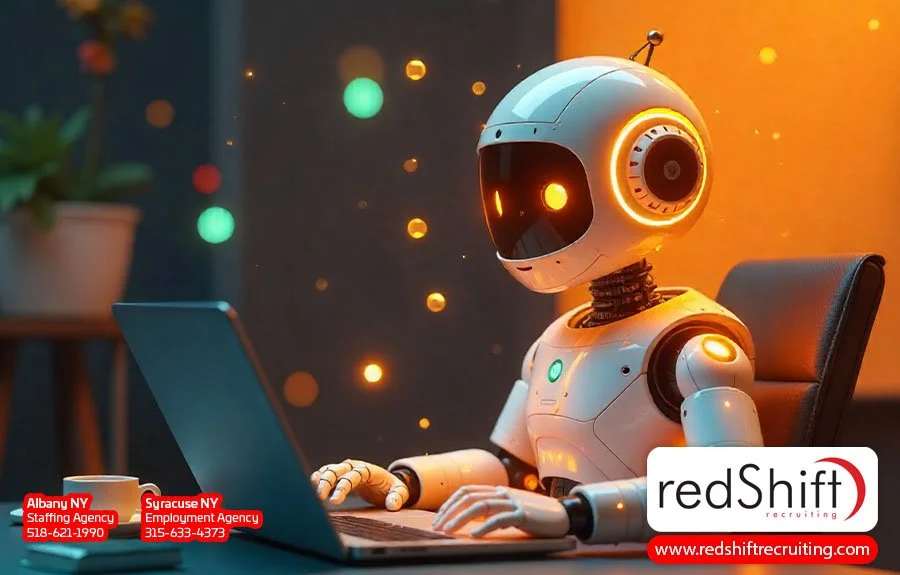
Real-World Applications of AI Agents and Operators
Now that we’ve outlined the key differences between AI agents and AI operators, what does that actually look like in practice? Across industries, we can see agents handling the bulk of routine, data-driven tasks while operators provide the oversight, strategy, and judgment that keep systems safe and aligned with business goals. A few examples include:
Recruitment
An AI agent might scan resumes, parse past data, and suggest candidates based on required skills. A human operator then steps in to ensure compliance, fairness, and cultural fit. While the agent handles the complex workflows of sourcing and ranking, operators provide the accountability that ensures hiring decisions balance efficiency with equity.
IT and DevOps
In IT environments, agents can continuously monitor system health and flag suspicious activity in real time. This information is then passed to a human or AI operator who decides how to respond, whether by rerouting processes, launching predictive maintenance, or escalating issues to IT teams. The result is reduced downtime across complex processes that interact with other systems, all while maintaining security and reliability.
Finance
In finance, agents can generate reports, summarize regulations, or automate repetitive tasks like reconciliations. Operators validate results, ensure that sensitive data is handled correctly, and confirm that outputs meet compliance standards. They also provide human review when needed to confirm accuracy and compliance while ensuring AI tools connect seamlessly with other accounting or risk systems.
Other Industries
Recruitment, IT, and finance are just starting points, as AI agents and operators reshape a broad range of sectors across the business world. In healthcare, they manage patient data and support diagnostics. In logistics, agents optimize routes and track shipments while operators step in when conditions change. Meanwhile in manufacturing, they coordinate robotics and maintain quality control. Even in cybersecurity, agents can play a key role in detecting risks so operators can decide how to respond.
These snapshots show the scale of these technologies: wherever there are automated workflows and opportunities to problem-solve, agents and operators are pushing innovation and becoming key parts of daily operations.
The Future of Agentic AI
As artificial intelligence advances, the roles of AI agents and operators are shifting rapidly. Agents are gaining the ability to act with more independence, powered by generative AI models and advanced large language model architectures, which are already transforming how people interact with technology. Together, these systems support everything from content creation to natural language understanding, forming the backbone of many modern AI applications. Still, these systems have limits: they can only work with the data they were trained on, they can only “remember” a certain amount of information at once (their context window), and they often struggle when faced with unpredictable real-world conditions. These factors mean autonomous decision-making without human oversight is still very risky, and the role of the human AI operator continues to be critical.
At the same time, orchestration platforms are emerging as a form of AI-as-operator, coordinating fleets of agents across multi-agent systems. These agentic systems are becoming more context aware and capable of managing multiple tasks across sectors. The question for the future isn’t whether agents will act more independently—it’s how humans and AI will share the responsibility of guiding and governing them.
How Employers Can Apply AI Strategically
For organizations, the next wave of opportunity lies in designing AI strategies that balance autonomy with accountability. Employers will increasingly deploy agents to automate repetitive tasks, streamline complex processes, and support decision-making in areas like supply chains and customer interactions. Operators—whether human or AI—will focus on oversight, ensuring that outputs align with business goals, compliance standards, and ethical boundaries. This balance allows companies to use AI tools more effectively, integrating them with other systems to improve efficiency and productivity.
Career Paths in a Future With Autonomous AI Agents
For professionals, the distinction between building and overseeing agents is creating clear career paths. Some roles, like Machine Learning Engineers and AI Research Scientists, specialize in development—designing agents that can problem-solve and adapt to user inputs, while continuously fine-tuning AI models to perform better on specific tasks over time. In other organizations, Software Engineers may embed agents into larger applications or platforms, while AI Architects design the overall frameworks that connect agents with other systems. Mid-level roles such as AI Trainers or Automation Specialists also contribute by configuring agents and making sure they align with day-to-day business needs.
On the other side, oversight-focused roles are beginning to expand. Established positions such as Compliance Officers and AI Product Managers are taking on more responsibility for guiding and managing agent use. At the same time, newer roles like AI Governance Specialists and Ethical AI Leads are emerging to handle accountability, transparency, and organizational risk. These professionals focus on accountability and oversight: deciding when it makes sense to assign tasks to AI tools, setting boundaries for their autonomy, and stepping in when autonomous AI agents act in ways that could compromise quality, ethics, or compliance.
Both tracks will demand adaptability and cross-disciplinary skills. Professionals who can bridge technical expertise with managerial judgment will be best positioned to stay ahead as the workplace continues to evolve around AI technology.
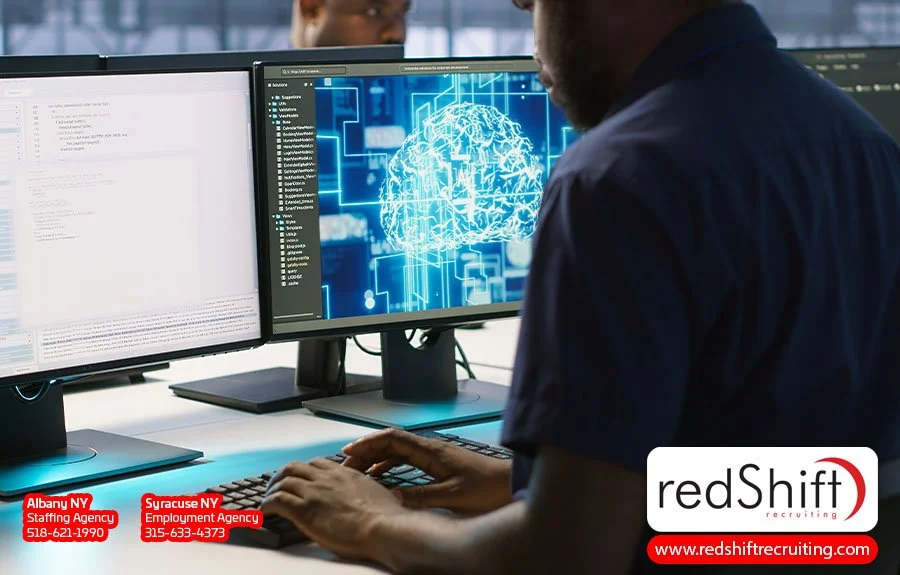
Frequently Asked Questions
Why Are AI Agents and AI Operators Often Confused?
The terms sound similar, and both sit within the same artificial intelligence ecosystem. Confusion also comes from the fact that operators don’t perform work directly, making it easy to assume they’re just another type of agent. In reality, agents are the “doers” that handle tasks, while operators—human or AI—guide outcomes, enforce oversight, and ensure capabilities are aligned with organizational goals.
How Do AI Agents and AI Assistants Differ?
The terms are often used interchangeably, but they aren’t the same. AI agents are the broader category—autonomous systems that can perceive their environment, make decisions, and take action toward a goal. They might work behind the scenes on tasks like managing complex workflows or coordinating other systems.
AI assistants, on the other hand, are a type of agent designed to interact directly with people. Think of chatbots, scheduling tools, or virtual helpers that respond to user inputs. They usually handle more structured, predefined tasks, while other agents may operate in less visible roles that integrate with business processes or technical pipelines.
In short: all AI assistants are agents, but not all agents are assistants.
What Skills Are Needed to Work With AI Agents and Operators?
Success in this field requires both technical and strategic abilities. On the technical side, skills in data analysis, system development, and working with AI tools are valuable for building and refining agents. On the strategic side, operators need strong communication, compliance awareness, and the ability to connect outputs to business needs. Because these roles often span IT, finance, and human resources, employers are increasingly looking for adaptable professionals who can bridge technical and organizational priorities.
What Risks Come From Relying Too Much on AI Agents Without Operators?
Agents can handle many tasks, but if left unchecked they can mismanage sensitive data, escalate small issues into larger failures, or create inefficiencies when they act independently without guardrails. For example, a misconfigured agent might trigger unnecessary actions across other systems, incorrectly approve transactions, or give misinformation. Human operators reduce these risks by providing accountability, ethical oversight, and the ability to step in with direct human intervention when needed.
Are AI Operators a New Career Path for Humans?
Yes, and it’s one that blends technical expertise with strategic thinking. Many organizations are already looking for professionals who can coordinate agents, manage compliance, and connect outputs to business outcomes. These roles are emerging in IT, finance, and even human resources, where ensuring fairness and accountability is critical. As adoption grows, the demand for operator skills will expand into other areas, creating new opportunities for workers who can combine technical knowledge with leadership skills.
How Will the Relationship Between AI Agents and Operators Evolve in the Future?
We’re still in the early days, but the pattern is clear: agents will gain greater autonomy, powered by generative AI and advanced AI tools, while operators—human and AI alike—will expand into governance and strategy. Over time, agentic systems and orchestration platforms will allow operators to coordinate fleets of agents across industries, from supply chains to healthcare. The key to the future will be maintaining balance: letting agents excel at execution while operators provide the oversight needed to ensure safety, compliance, and innovation.
Conclusion
While the terms may sound similar, AI agents and AI operators play very different roles. Agents are the “doers,” built to perform tasks and, in some cases, act with autonomy. Operators provide the structure, accountability, and oversight that keep those results aligned with business goals and ethical standards.
The most effective use of AI tools comes when these roles work in tandem—agents driving execution, operators guiding strategy. Together, they create systems that are not only more productive and efficient, but also safer, more reliable, and better prepared to adapt as AI continues to evolve.
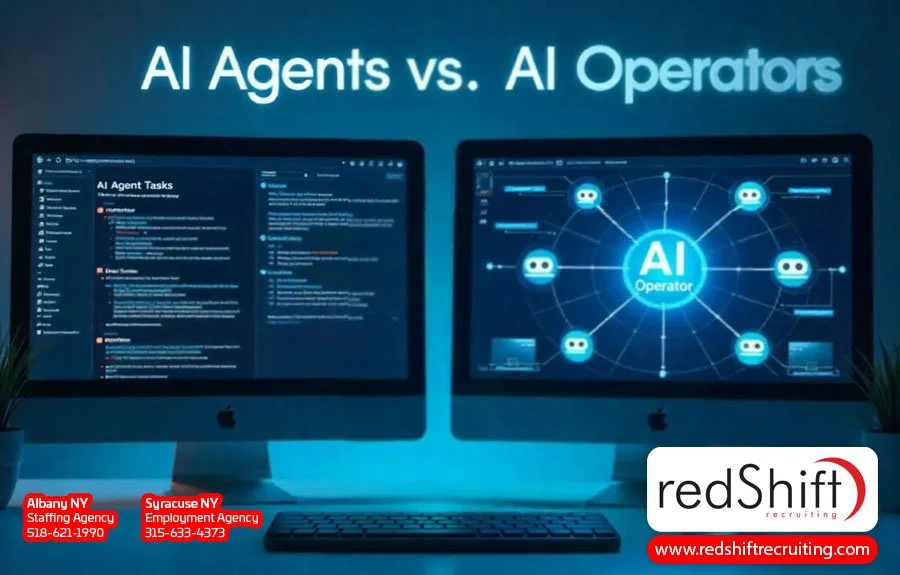

Article Author:
Ashley Meyer
Digital Marketing Strategist
Albany, NY
from Career Blog: Resources for Building a Career - redShift Recruiting https://www.redshiftrecruiting.com/career-blog/ai-agents-vs-ai-operators
via redShift Recruiting
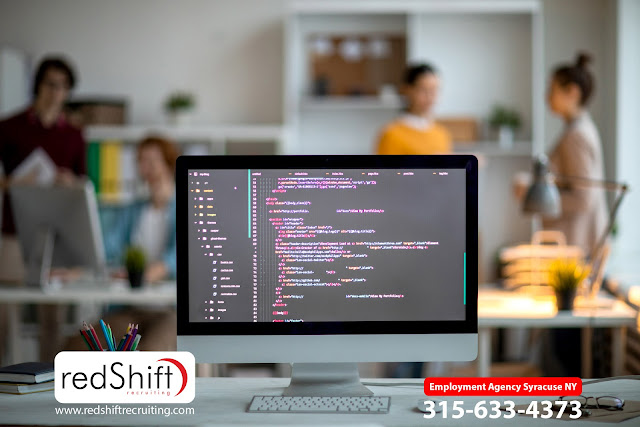
Comments
Post a Comment